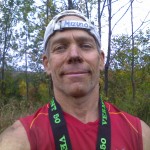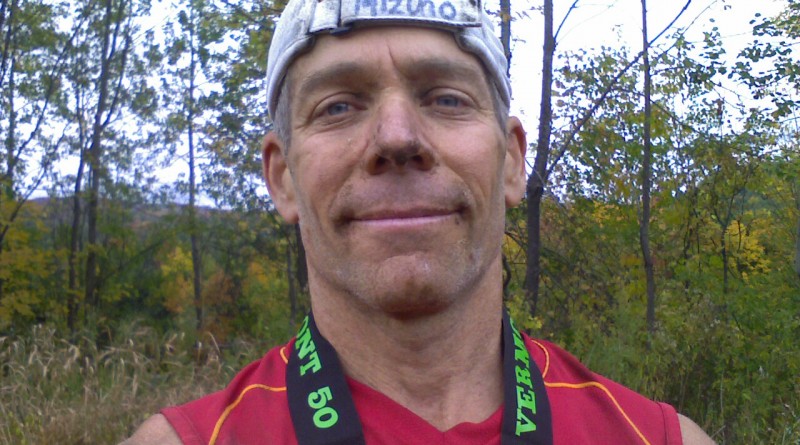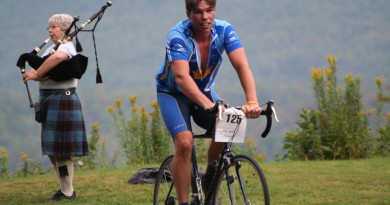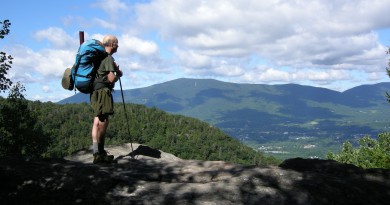Jack Pilla, Reader Athlete May 2011
Jack Pilla
 Age: 52
Age: 52
Residence: Charlotte
Family: Kelly Wilson, significant other; three kids, Ashley, Kate, and Nick
Occupation: Running Coach, Real Estate Agent
Primary sport: Running
VS: When did you start running?
JP: I only started running about 10 years ago. I had done other endurance sports and had always been active, but I had had some knee issues. Once I figured out how to deal with those issues, I started running.
VS: When did you run your first marathon?
JP: My first marathon was the Keybank Vermont City Marathon in 2001. I was part of a relay team, and I was assigned to do the first two legs; but I felt good, so I just kept running until just before the finish line. My first official full marathon was the VCM in 2002. All in all, I’ve run about 30 marathons.
VS: But marathons aren’t really enough for you, are they? You’re actually an ultramarathoner.
JP: You’re right. I found that 26 miles wasn’t enough. I knew I could go farther, so I started running ultras in 2004 or 2005. My running career went pretty quickly from not running to running to running marathons to, “Why not go farther?”
VS: You are the first Vermont man to win Vermont 100 (held every July in West Windsor). How does that feel?
JP: I won that race in 2009. It felt good doing it on the home turf. I had a lot of friends and support there, so it was a victory for all of us as a team, not just me. That was the first year without Jim Hutchinson, who had organized the race for many years (he passed away), and had been a great director. His daughter took over for him, so it was great to have a Vermonter win as a tribute to Jim. At this point, I’ve probably run 50 ultra races.
VS: Is there a different mindset for ultras versus marathons?
JP: Whether it’s a road marathon or a trail ultra, you put in your mind that you’re going to do a certain distance, and you program yourself for that. A marathon is run on a much harder surface, and obviously, it’s a faster pace. I prefer ultras because you’re out in the woods and on trails, on softer surfaces. I tend to do better in longer races. The farther I have to go, the better I am overall.
VS: I understand you have a special role in the VCM this year.
JP: This year I was put in charge of coordinating the pace group leaders. We have 17 people who have been recruited to do that. I got in touch with a number of local runners, and some from out of town. The VCM has a list of people, but I also asked folks who are part of the Green Mountain Athletic Association. The pacers go a little bit slower than usual and bring other runners with them. On the whole, runners like to help other people enjoy our sport, and reach their goals. One of our pacers is a woman who has paced in more than 200 marathons.
VS: Tell us about your most memorable races.
JP: I guess my most memorable marathon was in Boston in 2008, when I finished in 2:43. My most memorable VCM was the first time I broke three hours. That was a big goal. It’s a big number; a mark that a lot of people shoot for. Obviously, winning the Vermont 100 was a memorable ultra, but the year before, I did a race in Utah where I was up against a lot of the big names in ultra running. I had just turned 50, and I came in third overall and set an age-group record. It was fun running on their turf and doing well.
VS: You’re now a Certified Running Coach. How did that come about?
JP: The real estate business hasn’t been that good, so I took classes to get certified. I found that people were looking for coaches, and many were approaching me for help in doing ultras. Initially, I didn’t think a lot would come out of it. I learned quite a bit about things I was doing right and wrong, and what was a “hobby job” has now become my regular job. People typically want to train for a particular race, so I help them set goals and monitor them. I work with athletes from across the country and Canada.
VS: What other sports do you do?
JP: I do Alpine and Nordic skiing in the winter, as well as mountain biking, hiking, and skydiving. Skydiving is mental training. It’s really good for the head and very relaxing.
VS: Do you have an off season for running?
JP: I’ve had a streak going for the last four-and-a-half to five years, where I’ve run every day. Typically, in the winter, I’ll wear a trail shoe, even when running on roads, for extra traction, but I still get out there.
VS: How do you find time to train?
JP: There are 24 hours in every day. I don’t have any set time for running; it’s whenever I have a free moment. I’m not a great early morning runner, but you might see me out on the road at midnight.
VS: What advice would you give folks who want to make the jump from marathons to ultras?
JP: Just do it. It’s really not a big step up; it’s more mental than anything. Generally, you’re running on softer surfaces, so you might not hurt as much afterwards. It’ll take you longer, but typically, you’re out in the woods running along, and the time goes quickly. There are great people out on the trails. There’s a wonderful group in the greater Burlington area, and there are more and more people stepping into the ultra world.
—Phyl Newbeck



